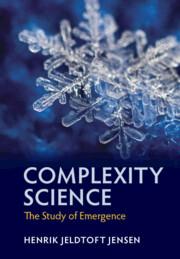We mentioned around Eq. (1.1) and in Sec. 1.1 that without interaction between component, new emergent properties
Question:
We mentioned around Eq. (1.1) and in Sec. 1.1 that without interaction between component, new emergent properties cannot be generated.
Data From Equation (1.1)
 Nevertheless, sometimes people do mention pressure as an emergent property, like in this quote by J. A. Wheeler (1911–2008) from p. 341 in [143]:
Nevertheless, sometimes people do mention pressure as an emergent property, like in this quote by J. A. Wheeler (1911–2008) from p. 341 in [143]:
In thinking about the world in the large, I have another phrase that I like, borrowed from my Princeton colleague Philip Anderson: “More is different”. When you put enough elementary units together, you get something that is more than the sum of these units. A substance made of a great number of molecules, for instance, has properties such as pressure and temperature that no one molecule possesses. It may be a solid or a liquid or a gas, although no single molecule is solid or liquid or gas.
(a) Reproduce the argument given in this chapter for why the pressure of a gas is not an example of an emergent property.
(b) Can you think of a sense in which, asWheeler proposes, pressure can be seen as an emergent property?
(c) According to the viewpoint of Anderson mentioned in Sec. 1.2, would Anderson agree with Wheeler and classify pressure as an emergent phenomenon?
(d) Assume with Wheeler that pressure is an example of emergence and make a list of similar ‘emergent’ properties, such as mass, height, population of a country, etc.
(e) Let us assume we go along with Wheeler and accept the pressure of a noninteracting gas as an emergent phenomenon. From this perspective, can you think of any property of a system containingmultiple components that are not emergent?
Step by Step Answer:

Complexity Science The Study Of Emergence
ISBN: 9781108834766
1st Edition
Authors: Henrik Jeldtoft Jensen





